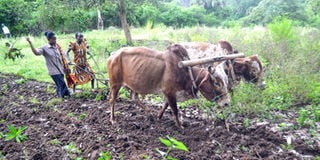Land ownership: Why women in Kenya still need help despite progress in recent years
Sponsored by KELIN

By Pauline Ongaji
Land is central to life. It is a direct source of livelihood for a majority. Therefore, it is an emotive subject.
In Kenya, land matters are made more delicate by the complexity of the laws governing ownership and the historical differences in their implementation in different parts of the country.
Only one percent of women in Kenya have land registered solely in their names, and an even smaller percentage jointly registered with their spouses. Owing to entrenched cultures, many communities are yet to fully accept the idea of a woman owning land. Hence, women are often sidelined when it comes to owning and inheriting land.
This owes to a generally patriarchal culture that views women as dependent on men, and are accordingly not accorded equal opportunities in property ownership and inheritance.
Though the Constitution of Kenya provides for women’s right to own, access and inherit land and other forms of property, they still struggle to realise this right. They have to contend with disparities and injustices in land ownership, and poverty.
The enjoyment of land and property rights is additionally hindered by limited or lack of awareness of the existence of these laws by women and society in general.
Customary laws are applied with extreme favour towards men. Moreover, the decision-making processes in most organs or bodies dealing with land matters are male-dominated and limit the participation of the women.
The interplay of these factors prevent women from asserting their property and inheritance rights and deprive them of participating in economic activities.
The cultural stereotypes on women land ownership has a negative ripple impact. First, women without land and property rights are economically insecure and prone to poverty as a result of which they are forced to rely on their spouses or male relatives for survival. This makes them more vulnerable to domestic violence and unable to leave abusive relationships or negotiate for safer sex, thus exposing them to a high risk of contracting HIV.
The Constitution of Kenya covers these inequalities through the provisions of affirmative action, which are aimed at countering the effects of long-term discrimination against groups such as women, persons with disability, minorities, among others.
The Constitution has dealt with the issue of gender discrimination in land and property acquisition and use. For instance, Article 60(1)(f) calls for the elimination of gender discrimination in practices relating to land and property rights, while Article 68c(iii) provides that parliament shall enact legislation to regulate the recognition and protection of matrimonial property and in particular the matrimonial home, during and on the termination of a marriage.
Further, Article 68c(VI) protects dependants of a deceased person, holding any interest in land, including the interests of spouses in actual occupation of land.
And there have been some gains. For example, under the Land Registration Act at Section 28(a), spousal rights to matrimonial property are considered overriding interests. The general rule is that all interests and rights over a piece of land have to be written on the register of that land.
Under Section 93, if a spouse obtains land for co-ownership and use of both spouses or all the spouses, there is a presumption that the spouses shall hold the land as joint tenants.
Section 60 provides that if property is registered under joint tenancy and one tenant dies, then the property is automatically transmitted to the surviving spouse upon proof of death to the registrar.
And, under the Land Act, Section 79(3), requires spousal consent for the transfer, dealing with and registration of any rights to matrimonial property.
But despite all these milestones, more still needs to be done to address women land and property ownership rights.
With everything taken into account, all members of the society have equal responsibility to safeguard and protect women and children from land and property rights violations, such as disinheritance and asset stripping.


